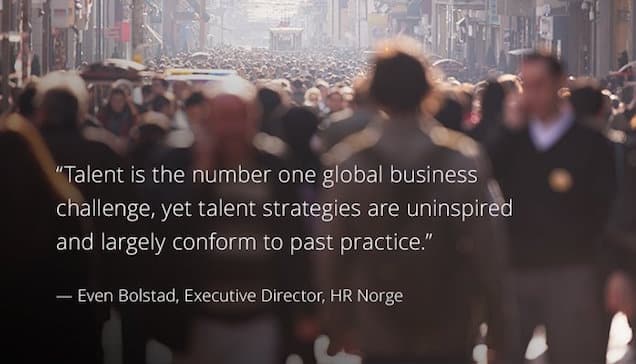Agile Talent; The New Must-Have for Lasting Organisations

- When you wanted to buy a book, you went to a bookshop where the book you were after was probably out of stock and would have to be ordered. Now you type amazon.com and click.
- If you found nothing interesting on TV, you could brave the cold weather and dash out to the video store but often would not find a film that interested you. Now you have a choice of countless titles on HBO or Netflix without getting up.
Professional literature has begun to refer to today’s society as VUCA-world, standing for volatile, uncertain, complex and ambiguous. The pace of change not only affects humans: it also has a profound impact on companies and businesses. Whereas globally the life expectancy of humans has increased by five years since 2000, the average lifespan of an American business has shrunk to 15 years from an average of 45 in the 1950’s.
Extrapolating from this, if today’s businesses do not adjust their ability to innovate, their lifespan may diminish further, to no more than five to ten years in the foreseeable future! The only way for them to escape this fate is to ensure that they continue to reinvent themselves.
NEW VALUES
Companies also have to deal with a whole new set of foundational values. Until recently, organisations tried to protect their knowledge through patents. But thanks to mainstreaming the internet, a transparent world has emerged in which sharing has become the new normal.
Knowledge itself now has a lifespan similar to that of fresh fish. In fact, the speed of acquiring and using knowledge has replaced knowledge for its own sake. Similarly, while capital remains vital to businesses, it has ceased to be the defining factor. Neither capital nor other goods still offer any guarantee of success.
So, how are companies able to increase their ability to innovate and keep up with the exponential changes?
The capacity to innovate has gone from being important to being critical in the success of a business. Some of the ways to do this include, for example, increasing awareness of technological advances through sophisticated automation of self-learning programmes, or the use of big data analyses to increase efficiency. Innovation can also be spurred by tapping into future-proof or agile talent.
REINVENT FROM WITHIN
In brief, ‘agile talent’ refers to professionals eager to learn and keen to innovate; they will reinvent a company from within. My personal definition of agile talent focuses on those talented people who possess the ability to adapt quickly and efficiently to changing backgrounds or circumstances.
Agile talent is resilient, adaptable and excels at translating what it has learnt into new methods and actions. Being able to implement any new knowledge is an absolute given.
People who possess agile talent are keen to and able to discern patterns in their experiences; they posses a rich capacity for learning. But this also encompasses the ability to unlearn old tricks and habits. This might be more difficult and crucial than you would imagine.
Here’s how the futurist Alvin Toffler summarized it: “The illiterate of the 21st century will not be those that cannot read or write, but those that cannot learn, unlearn and relearn.”
(Next in Agile Talent: Rapid Developments and Selections that Fail)


